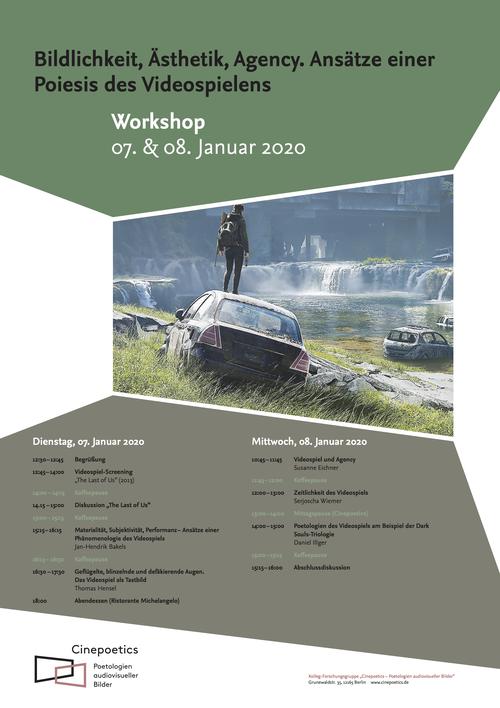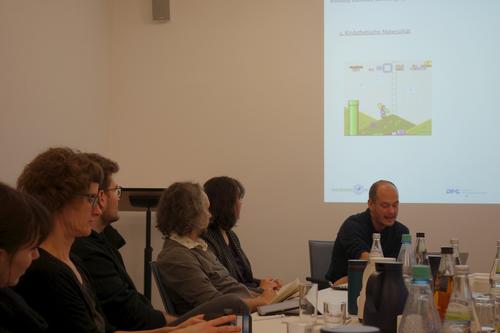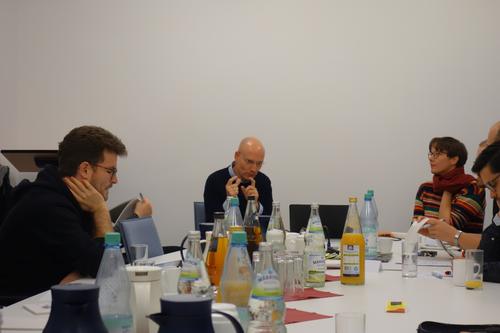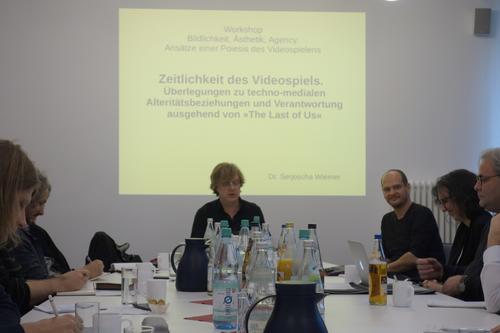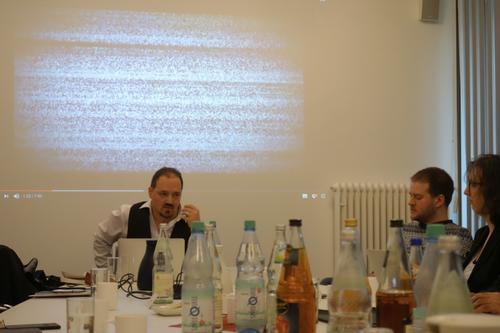Bildlichkeit, Ästhetik, Agency: Ansätze einer Poiesis des Videospielens
07./08.01.2020 | Workshop by the Cinepoetics group with Susanne Eichner, Thomas Hensel und Serjoscha Wiemer.
Research Focus: Beyond Spectatorship
A focal point for the workshop's theme, a poiesis of video gaming, was the screening of The Last of Us (2013), a survival horror game by Naughty Dog Studios. It contained 90 minutes of gameplay by the workshop group with a concluding 90-minute discussion. While debating over the dualism of an open-world-experience versus linear gameplay, there were also several contributions on the "cinematic" quality of video games as well as the specific aesthetics of the survival genre.
The first presentation by Jan-Hendrik Bakels highlighted the kinesthetic dimension of video gaming. With regard to a number of games ranging from Tetris (1989) to Red Dead Redemption II (2019), he analyzed the material aesthetics of video games in the player's kinesthetic perception. Each Tetramino, an L-, Z- or T-shaped stone in the Soviet game of skill, conveys the impression of a certain weight when connected to the 8-bit bass sound and the increasing pace of each level. In Red Dead Redemption II, a more complex game setting, the avatar becomes a perception-object towards which the players project aspects of their subjective media experiences.
Thomas Hensel’s talk "Geflügelte, blinzelnde und defäkierende Augen. Das Computerspiel als Tastbild" focused on iconographies of the eye in multiple video games. He traced such ophthalmological representations to their art historical roots and drew insightful connections to each game's mechanics. This became especially apparent when Hensel linked Leon Batista Alberti’s flying eye-signet – something that looks in feeling ["ein im Fühlen Blickendes"] – to his theory of a game act, which he described as the merging of point-of-view and point-of-action in the player's avatar.
On the second day of the workshop, Susanne Eichner presented her work on video games and agency. Coming from media and communications studies, she urged an argument for agency as, following Janet Murray, a "satisfying power to take meaningful actions and see the results of our decisions." When applied to studies on video gaming, one could bypass the overused term ‘interactivity’ in this field. Agency asks about "meaningful actions", which is especially interesting for an inquiry into the “work-sided potential” of aesthetic experience, Eichner inferred.
Serjoscha Wiemer embarked on a self-reflexive journey in his talk on the temporality of video games: "Zeitlichkeit des Videospiels. Überlegungen zu techno-medialen Alteritätsbeziehungen und Verantwortung ausgehend von The Last of Us." While discussing theoretical concepts of alterity, for example by Jean-Luc Nancy and Emmanuel Levinas, he engaged in conversation with his own video game experience. On a third level, he compared these notions of self and otherness with the game's diegetic characters, Ellie and Joel, i.e. their understanding of each other: As the story progresses, both become playable avatars and, thus, can view each other through the subjective experience of the player.
The closing session of the workshop consisted of Daniel Illger's talk "Poetologien des Videospiels am Beispiel der Dark Souls-Trilogie." He also focused on aspects of temporality in Dark Souls, and in video games in general. With the trilogy's notoriously hard difficulty level, mash-ups of failing players have become a trend on YouTube. Some bosses might take several dozen attempts, which counteracts the seemingly linear time experience and shifts to a circular one. When combined with the specific level design of Dark Souls, playing the game becomes a distinct spatio-temporal experience that Illger links to Alain Badiou's dialectics of black and aspects of Anna Lowenhaupt-Tsing's concept of assemblage.
A final discussion highlighted the many untouched discourses in game studies that film and media theoretical concepts might enlarge upon – a task to be taken on by the Cinepoetics-based working group on video games that initialized this workshop.
